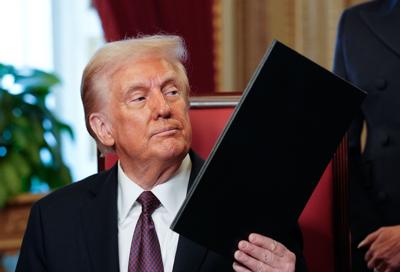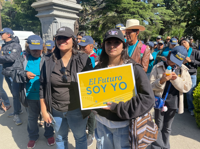
President Donald Trump on January 20 as he signed executive orders. (Photo by Melina Mara-Pool/Getty Images)
A few days after the nation went into a panic after learning that there would be a federal grant freeze affecting various programs associated with immigration, the LBTQ+ community, reproductive health care, climate energy, and others, advocates are fighting back.
On Thursday afternoon, California Congressman Robert Garcia (D-42) organized a video conference where he said the memo sent Monday night by President Donald Trump’s Office of Management and Budget (OMB) was “outrageous and cruel.”
He said it was a disruptive message to so many people who depend on those services, letting them believe that the federal government does not care for them.
What followed after the freeze memo has advocates still reeling from the topsy-turvy federal mandate for its rescission. Congressman Garcia and other advocates vow to keep fighting.
The OMB’s memorandum to all federal agencies required a temporary pause in their activities until there was a review of where their funding was going. The Trump Administration wanted to make sure none of the grants provided were connected to the six areas–energy, sanctuary cities, Diversity Equity Inclusion (DEI), climate, foreign aid and reproductive abortion care.
However, a set of immediate lawsuits was brought by many organizations across the nation, including the General Attorney of California, Rob Bonta, and 22 other states.
The movement caused a federal judge to freeze the OMB directive until Monday, February 3rd at 5 p.m. ET.
The OMB then sent a message on January 29 stating that the administration was rescinding its original memo to end confusion caused by the court’s injunction.
“President Trump wanted to freeze all of these grants, and we pushed back and at least have some type of reprieve right now to figure out what's going on, but that will continue,” said Garcia.
The federal funding in the form of loans and grants that would have affected vital programs that benefit from babies to seniors will continue, for now.
The process
Andrew Bower, legislative director with Congressman Garcia, said when Congress enacts funding, the president is required to disperse the money approved by the two houses of Congress and he doesn’t have the legal authority to refuse its spending.
He said the so-called freeze is a process that is already subject to litigation and can take weeks or months to implement, and it will be a recurring problem under the administration.
“There is a law called the Impoundment Control Act that gives [Trump] the right to request permission from Congress to hold back funds, but Congress has to vote to approve that request, otherwise the money goes out the door,” said Bower.
While the Trump administration tries to insist the act is unconstitutional and try to withhold funding, the final say has to be settled in court.
“This is going to be an ongoing struggle,” said Bower. “[Trump] does not have the authority to ignore the law.”
What to do next
While the order has been rescinded, Garcia said people keep asking what the community can do in the meantime. He said it is vital to be prepared to share their stories and how people will be affected if federal funding is removed from those six areas mentioned above.
“Those of you that have national organizations or are connected to a larger system [need to] continue to be engaged and share stories,” said Garcia.
Another thing that organizations can do is an internal assessment of all the grants they are receiving to have an idea of how much they can lose and how they can adapt in case the federal freeze happens.
Garcia said it is “horrific” to think Trump wants to remove federal aid from LGBTQ+ organizations like county health departments and DEI initiatives.
“We just don’t know what’s going to happen there,” he said.
Garcia said the federal freeze information is chaotic because the initial information was revealed through a tweet late at night.
While the OMB assured the Head Start program, student loans, Medicare, Social Security and Medicaid wouldn’t be affected, they noticed the next day that Medicaid website pages were affected by the announcement. Also, community health centers encountered problems accessing the Medicaid payment portal.
Bower said all of the executive orders and administration rules are sort of deliberately vague.
In the meantime, Garcia said they are in communication with State Attorney General Rob Bonta. In support are also California Governor Gavin Newsom and U.S. Senators Alex Padilla and Adam Schiff.
So while the original OMB memo has been rescinded, the executive orders signed by President Trump are still in effect. Some entities tied to those executive orders may still experience funding issues. Therefore, action is needed, said Garcia.
“We just got to stay united. Reach out to us. Let's continue to support each other,” said Garcia. “This is not a moment for all of us to be quiet and stand on the sidelines. You've got to be vocal, you've got to come out, you've got to support and make our voices heard.”











(0) comments
Welcome to the discussion.
Log In
Keep it Clean. Please avoid obscene, vulgar, lewd, racist or sexually-oriented language.
PLEASE TURN OFF YOUR CAPS LOCK.
Don't Threaten. Threats of harming another person will not be tolerated.
Be Truthful. Don't knowingly lie about anyone or anything.
Be Nice. No racism, sexism or any sort of -ism that is degrading to another person.
Be Proactive. Use the 'Report' link on each comment to let us know of abusive posts.
Share with Us. We'd love to hear eyewitness accounts, the history behind an article.